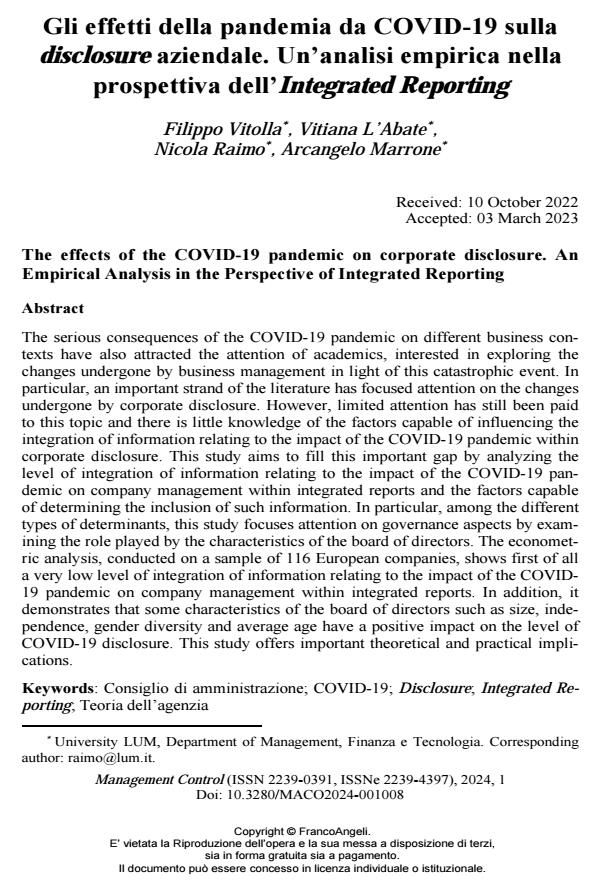The effects of the COVID-19 pandemic on corporate disclosure. An Empirical Analysis in the Perspective of Integrated Reporting
Journal title MANAGEMENT CONTROL
Author/s Filippo Vitolla, Vitiana L’Abate, Nicola Raimo, Arcangelo Marrone
Publishing Year 2024 Issue 2024/1
Language Italian Pages 23 P. 155-177 File size 310 KB
DOI 10.3280/MACO2024-001008
DOI is like a bar code for intellectual property: to have more infomation
click here
Below, you can see the article first page
If you want to buy this article in PDF format, you can do it, following the instructions to buy download credits

FrancoAngeli is member of Publishers International Linking Association, Inc (PILA), a not-for-profit association which run the CrossRef service enabling links to and from online scholarly content.
The serious consequences of the COVID-19 pandemic on different business con-texts have also attracted the attention of academics, interested in exploring the changes undergone by business management in light of this catastrophic event. In particular, an important strand of the literature has focused attention on the changes undergone by corporate disclosure. However, limited attention has still been paid to this topic and there is little knowledge of the factors capable of influ-encing the integration of information relating to the impact of the COVID-19 pan-demic within corporate disclosure. This study aims to fill this important gap by an-alyzing the level of integration of information relating to the impact of the COVID-19 pandemic on company management within integrated reports and the factors capable of determining the inclusion of such information. In particular, among the different types of determinants, this study focuses attention on gov-ernance aspects by examining the role played by the characteristics of the board of directors. The econometric analysis, conducted on a sample of 116 European companies, shows first of all a very low level of integration of information relating to the impact of the COVID-19 pandemic on company management within inte-grated reports. In addition, it demonstrates that some characteristics of the board of directors such as size, independence, gender diversity and average age have a positive impact on the level of COVID-19 disclosure. This study offers important theoretical and practical implications.
Keywords: Consiglio di amministrazione; COVID-19; Disclosure; Integrated Re-porting; Teoria dell’agenzia
Filippo Vitolla, Vitiana L’Abate, Nicola Raimo, Arcangelo Marrone, Gli effetti della pandemia da COVID-19 sulla disclosure aziendale. Un’analisi empirica nella prospettiva dell’Integrated Reporting in "MANAGEMENT CONTROL" 1/2024, pp 155-177, DOI: 10.3280/MACO2024-001008